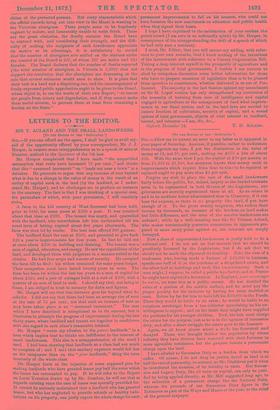LETTERS TO THE EDITOR.
SIR T. ACLAND AND THE SMALL LANDOWNERS.
[TO THE EDITOR OF THE "SPECTATOR.']
Sm,—If you can afford me the space, I shall be glad to avail my- self of the opportunity offered by your correspondent, Mr. J. J. Hooper, to remove some misapprehension as to a speech of mine at Dunster, noticed in the Spectator of the 7th inst.
Mr. Hooper complained that I have made " the unqualified -assumption that rents have increased 75 per cent.," and thinks that this " unearned increment " on " lands not near a town " is a delusion. He proceeds to argue that any increase of rent beyond what is due to a change in the value of money is the result of an outlay of capital sunk in the land (by the landlord, as I under- stand Mr. Hooper), and he challenges me to produce an instance 'to the contrary. The fact is that I was thinking of a special case, the particulars of which, with your permission, I will concisely state.
A farm in the hill country of West Somerset had been held, prior to 1840, for some years at £200 a year. It was revalued about that time at £220. The tenant was angry, and quarrelled with the landlord, who nevertheless left him undisturbed till his usual term of letting expired about five years afterwards. The farm was then let by tender. The beat man offered 300 guineas.
The landlord fixed the rent at £300, and promised to give back 150 a year in improvements for four years. In fact he laid out at once about £500 in building and draining. The tenant was a man of capital, education, and energy. lie saw the capabilities of the land, and developed them with judgment in a manner suited to the -climate. He had free scope and a sense of security. He occupied 'the farm till he died ; his widow remained for some years longer. Their occupation must have lasted twenty years or more. The farm has been let within the last ten years to a man of capital for about £340, and a pair of cottages built at a cost of £250, with a quarter of an acre of land to each. I should say that, not being at home, I am obliged to trust to memory for dates and figures.
Mr. Hooper will see that this instance goes far beyond what he asks for. I did not say that there had been an average rise of rent at the rate of 75 per cent., nor that such an increase of rent as may have taken place is an " unearned increment." The case which I have described is exceptional as to its amount, but it illustrates in principle the progress of improvement during the last thirty years, where landlord and tenant act together in confidence avith due regard to each other's reasonable interest.
Mr. Hooper " notes my allusion to the poorer landlords " in a tone which implies that he thinks me indifferent to the interest of small landowners. This also is a misapprehension of the word I .used. I had been showing that landlords as a class had not much `to complain of ; and I said that sanitary expenses would fall leas -on the ratepayers than on the "poor landlords," citing the term ironically of the whole class.
Mr. Hooper hints at the injustice of some supposed plan for making landlords who have granted leases pay half the rates which the lessee has covenanted to pay. If he will refer to the Report on Local Taxation drawn up by Mr. Goschen, he will see that as regards existing rates the case of leases was specially provided for. It cannot be seriously maintained that a landlord who has granted leases, but who has neglected to provide schools or healthy habi- tations on his property, can justly expect the whole charge for such
permanent improvements to fall on his tenants, who could not have foreseen the new enactments on education and public health when they' signed their leases.
I hope I have explained to the satisfaction of your readers the points raised (I am sure in no unfriendly spirit) by Mr. Hooper, in consequence of his misapprehending the drift of a speech of which he had only seen a summary.
I trust, Mr. Editor, that you will excuse my adding, with refer- ence to your own remarks, that I know nothing of the intentions of the Government with reference to a County Organisation Bill. Taking a deep interest myself in the prosperity of agriculture and in the progress of local government, I confess I am anxious to elicit by outspoken discussion some better information for those who have to prepare measures of legislation than is to be gleaned from speeches to constituents, whether delivered in or out of Par- liament. The majority in the last Session against my amendment on Sir M. Lopes' motion has only strengthened my conviction of the necessity of learning from men of intelligence and capital engaged in agriculture or the management of land what improve- ments in our fiscal system and in the land laws are needed to ensure freedom of cultivation, security of capital, and a sound system of local government, objects of vital interest to landlord, tenant, and labourer.—I am, Sir, &c.,






































 Previous page
Previous page